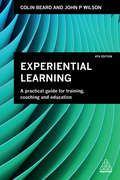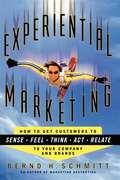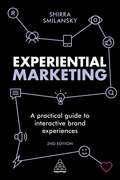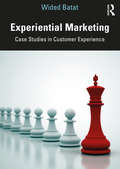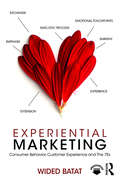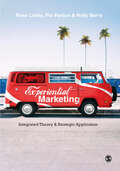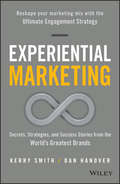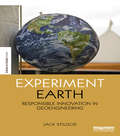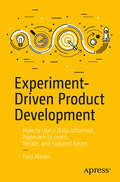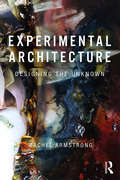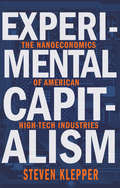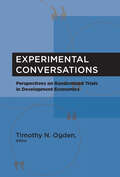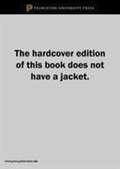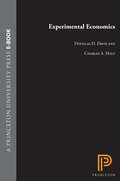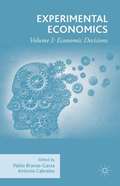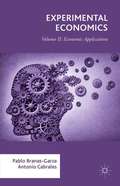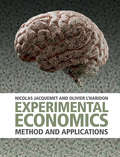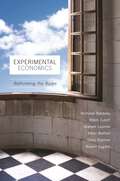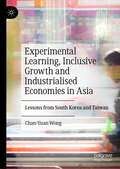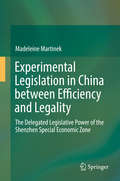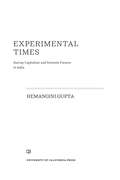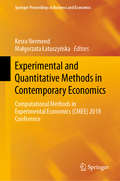- Table View
- List View
Experiential Learning: A Practical Guide for Training, Coaching and Education
by John P. Wilson Colin BeardIn a fast-paced and innovative world, traditional training methods can no longer be relied on to improve performance, engagement or promote behavioural change. Experience-based learning is more affordable, appealing and effective than ever before. Experiential Learning combines in-depth theory with international case studies from companies including Interface, Shell and the UK National Health Service (NHS) and numerous practical tools to consider when developing and delivering learning experiences in either for-profit or not-for-profit organizations. It presents a simple model, the Learning Combination Lock, which enables trainers, coaches, facilitators and educators to select the best strategies for their circumstances to maximize comprehension, knowledge retention and application. Essential reading for anyone designing and delivering learning experiences, it covers experiential learning activities, experience and intelligence, coaching and facilitation, best practice and ethics, learning environments (both indoor and outdoor) and working with the senses and emotions to help promote behavioural change.In addition to featuring new international case studies, this fully revised 4th edition of Experiential Learning considers how to develop positive habits for learning, covers the mechanisms that help people to learn and the reviewing and reflection process. It also explores the topics of gamification, 3D learning and virtual reality. Online supporting resources include audio files that introduce sensory intelligence.
Experiential Marketing
by Bernd H. SchmittEngaging, enlightening, provocative, and sensational are the words people use to describe compelling experiences and these words also describe this extraordinary book by Bernd Schmitt. Moving beyond traditional "features-and-benefits" marketing, Schmitt presents a revolutionary approach to marketing for the branding and information age. Schmitt shows how managers can create holistic experiences for their customers through brands that provide sensory, affective, and creative associations as well as lifestyle marketing and social identity campaigns. In this masterful handbook of tools and techniques, Schmitt presents a battery of business cases to show how cutting-edge companies use "experience providers" such as visual identity, communication, product presence, Web sites, and service to create different types of customer experiences. To illustrate the essential concepts and frameworks of experiential marketing, Schmitt provides: SENSE cases on Nokia mobile phones, Hennessy cognac, and Procter & Gamble's Tide Mountain Fresh detergent; FEEL cases on Hallmark, Campbell's Soup, and Häagen Dazs Cafés in Asia, Europe, and the United States; THINK cases on Apple Computer's revival, Genesis ElderCare, and Siemens; ACT cases on Gillette's Mach3, the Milk Mustache campaign, and Martha Stewart Living; RELATE cases on Harley-Davidson, Tommy Hilfiger, and Wonderbra. Using the New Beetle and Sony as examples, Schmitt discusses the strategic and implementation intricacies of creating holistic experiences for customers. In an intriguing final chapter, he presents turn-around techniques such as "Objective: To Dream," "Send in the Iconoclasts," and "Quit the Bull," to show how traditional marketing firms can transform themselves into experience-oriented organizations. This book will forever change your perception of customers, marketing, and brands -- from Amtrak and Singapore Airlines to Herbal Essences products and Gwyneth Paltrow.
Experiential Marketing: A Practical Guide to Interactive Brand Experiences
by Shirra SmilanskyThe immersive brand experience is revolutionizing brand engagement. Experiential Marketing, second edition, cuts through the jargon with clear practical guidelines on how to magnify marketing strategies to a powerful new level. This book emphasizes that experiential marketing is not just about creating a live event. A unique, immersive experience allows businesses to generate a surge of brand engagement, which is amplified immediately by a niche target of consumers through live content sharing and social media streams. This comprehensive second edition of Experiential Marketing pinpoints exactly where this innovative strategy fits in with the current marketing and events climate, including a step-by-step outline to plan, integrate and evaluate its game-changing results. The completely fresh content analyzes the latest industry advances and case studies, including four new chapters on the digital experience and merged realities, plus the experience economy and creative explosion of the 'Pop-Up' phenomenon. Accompanied with a digital toolkit of downloadable resources, this book is essential reading for marketing, business, media and events professionals alike, providing strategic decision makers with a unique competitive advantage in a vibrant new era of marketing strategy.
Experiential Marketing: Case Studies in Customer Experience (Routledge Interpretive Marketing Research Ser.)
by Wided BatatExperiential marketing has become an indispensable tool for all types of businesses across multiple sectors. This book provides an all-encompassing, practical, and conceptual map of contemporary experiential case studies, which together offer insights into this exciting approach to customer experience. Experiential Marketing incorporates 36 international case studies from 12 key sectors, from technology, consumer goods, and B2B to luxury, events, and tourism sectors. With a selection of case studies from leading brands, such as Coca-Cola, Nutella, Chanel, NASA, The New York Times, Pfizer, and Amtrak, the reader will learn and practice the experiential marketing tools and strategies through these examples. Expert testimonials, practical applied exercises, and the author’s online videos provide both theoretical foundations and concrete application. This is a must-read for advanced undergraduate and postgraduate Marketing and Customer Experience students and an excellent teaching resource. It should also be of great use to practitioners – particularly those studying for professional qualifications – who are interested in learning experiential marketing strategies and developing knowledge about the way big brands in different sectors are designing the customer experience online and offline. Online material includes lecture slides, a test bank of questions, an instructor’s manual, and explanatory videos.
Experiential Marketing: Consumer Behavior, Customer Experience and The 7Es
by Wided BatatWhy do some brands make us feel good, while others frustrate us? What makes us engage with certain brands, rebuy the same products, return to the same store or revisit the same destination over and over again? Is there a framework underlying how past and lived shopping experiences can affect our future experiences, our buying decisions, and our brand loyalty? In this exciting new book, Wided Batat introduces readers to the new customer experience framework and the era of the "Experiential Marketing Mix." She introduces the concept of the 7Es (Experience, Exchange, Extension, Emphasis, Empathy, Emotional touchpoints, Emic/Etic process); a tool that focuses on the consumer as a starting point in marketing strategies. By using these, companies can design suitable, emotional, and profitable customer experiences in a phygital context (physical place and digital space) including both offline and online digital experiences. Batat argues that a traditional product-centric should be replaced by the appropriate mix of 7Es, based upon a more consumer/experience-centric logic. Experiential Marketing is a guide to building experiences consumers cannot forget. It will be of interest for CEOs, brand managers, marketing and communication professionals, students, and anyone eager to learn more about how to design the ultimate customer experience in a new phygital. In this book, Professor Batat combines theory and practice and gives readers an overview of: the origins and the rise of the customer experience logic, the 7Es of the new experiential marketing mix, and the challenges for the future.
Experiential Marketing: Integrated Theory & Strategic Application
by Rose Leahy Pio Fenton Holly BarryAt a time when brand exposure is almost limitless, and ads have become more personalized than ever before, how do brands stand out and still win your attention? Having previously struggled to assert its credibility theoretically and amongst executives, experiential marketing now forms a core feature of most marketing practices. This book resets the perspective on the experience as an effective means of achieving corporate marketing objectives in a way that is structured, purposeful and measurable. Featuring over 40 examples from brands such as Netflix, Lego, Coca Cola, Vans, Asics and Sweaty Betty, this book revisits the theory around this type of marketing and shows you how to better integrate experiential marketing with other areas of marketing communications. The implementation model provided will help you develop robust campaigns that support overall marketing objectives and provide clarity on effectiveness to executives through a mechanism called Return on Integrated Experience (ROIE). Experiential Marketing faces new challenges in a post-Covid era – this book will be the basis for overcoming those challenges and providing opportunities to marketers everywhere. Rose Leahy is a lecturer and research supervisor in the area of marketing in Munster Technological University, Ireland. Pio Fenton is Head of Department of Marketing and International Business at Munster Technologicla University, Ireland. Holly Barry is a Brand Strategist at Barry Group, a leading wholesale distribution company in Cork, Ireland.
Experiential Marketing: Integrated Theory & Strategic Application
by Rose Leahy Pio Fenton Holly BarryAt a time when brand exposure is almost limitless, and ads have become more personalized than ever before, how do brands stand out and still win your attention? Having previously struggled to assert its credibility theoretically and amongst executives, experiential marketing now forms a core feature of most marketing practices. This book resets the perspective on the experience as an effective means of achieving corporate marketing objectives in a way that is structured, purposeful and measurable. Featuring over 40 examples from brands such as Netflix, Lego, Coca Cola, Vans, Asics and Sweaty Betty, this book revisits the theory around this type of marketing and shows you how to better integrate experiential marketing with other areas of marketing communications. The implementation model provided will help you develop robust campaigns that support overall marketing objectives and provide clarity on effectiveness to executives through a mechanism called Return on Integrated Experience (ROIE). Experiential Marketing faces new challenges in a post-Covid era – this book will be the basis for overcoming those challenges and providing opportunities to marketers everywhere. Rose Leahy is a lecturer and research supervisor in the area of marketing in Munster Technological University, Ireland. Pio Fenton is Head of Department of Marketing and International Business at Munster Technologicla University, Ireland. Holly Barry is a Brand Strategist at Barry Group, a leading wholesale distribution company in Cork, Ireland.
Experiential Marketing: Secrets, Strategies, and Success Stories from the World's Greatest Brands
by Dan Hanover Kerry SmithThe most researched, documented, and comprehensive manifesto on experiential marketing. As customers take control over what, when, why, and how they buy products and services, brands face the complete breakdown and utter failure of passive marketing strategies designed more than a half-century ago. To connect with a new generation of customers, companies must embrace and deploy a new marketing mix, powered by a more effective discipline: experiences. Experiential marketing, the use of live, face-to-face engagements to connect with audiences, create relationships and drive brand affinity, has become the fastest-growing form of marketing in the world as the very companies that built their brands on the old Madison Avenue approach--including Coca-Cola, Nike, Microsoft, American Express and others--open the next chapter of marketing. . . as experiential brands. Using hundreds of case studies, exclusive research, and interviews with more than 150 global brands spanning a decade, global experiential marketing experts Kerry Smith and Dan Hanover present the most in-depth book ever written on how companies are using experiences as the anchor of reinvented marketing mixes. You'll learn: The history and fundamental principles of experiential marketing How top brands have reset marketing mixes as experience-driven portfolios The anatomy of a brand experience The psychology of engagement and experience design The 10 habits of highly experiential brands How to measure the impact of experiential marketing How to combine digital and social media in an experiential strategy The experiential marketing vocabulary How to begin converting to experiential marketing Marketers still torn between outdated marketing models and the need to reinvent how they market in today's customer-controlled economy will find the clarity they need to refine their marketing strategies, get a roadmap for putting their brands on a winning path, and walk away inspired to transition into experiential brands.
Experiment Earth: Responsible innovation in geoengineering (The Earthscan Science in Society Series)
by Jack StilgoeExperiments in geoengineering – intentionally manipulating the Earth’s climate to reduce global warming – have become the focus of a vital debate about responsible science and innovation. Drawing on three years of sociological research working with scientists on one of the world’s first major geoengineering projects, this book examines the politics of experimentation. Geoengineering provides a test case for rethinking the responsibilities of scientists and asking how science can take better care of the futures that it helps bring about. This book gives students, researchers and the general reader interested in the place of science in contemporary society a compelling framework for future thinking and discussion.
Experiment-Driven Product Development: How to Use a Data-Informed Approach to Learn, Iterate, and Succeed Faster
by Paul RissenImproving your craft is a key skill for product and user experience professionals working in the digital era. There are many established methods of product development to inspire and focus teams—Sprint, Lean, Agile, Kanban—all of which focus on solutions to customer and business problems. Enter XDPD, or Experiment-Driven Product Development—a new approach that turns the spotlight on questions to be answered, rather than on solutions.Within XDPD, discovery is a mindset, not a project phase. In Experiment-Driven Product Development, author Paul Rissen introduces a philosophy of product development that will hone your skills in discovery, research and learning. By guiding you through a practical, immediately applicable framework, you can learn to ask, and answer, questions which will supercharge your product development, making teams smarter and better at developing products and services that deliver for users and businesses alike. When applying the XDPD framework within your organization, the concept of an experiment—a structured way of asking, and answering, questions—becomes the foundation of almost everything you do, instilling a constant sense of discovery that keeps your team inspired. All types of activities, from data analysis to writing software, are seen through the lens of research. Rather than treating research as a separate task from the rest of product development, this book approaches the entire practice as one of research and continuous discovery.Designing successful experiments takes practice. That’s where Rissen’s years of industry expertise come in. In this book, you are given step-by-step tools to ensure that meaningful, efficient progress is made with each experiment. This approach will prove beneficial to your team, your users, and most importantly, to your product’s lasting success.Experiment-Driven Product Development offers a greater appreciation of the craft of experimentation and helps you adapt it in your own context. In our modern age of innovation, XDPD can put you ahead. Go forth and experiment!What You Will LearnKnow how to approach product development in a leaner, more efficient wayUnderstand where and when experiments can be useful, and how they fit into pre-existing organization environments and processesRealize why you should be thinking about the simplest, useful thing rather than the minimum, viable productDiscover how to break down feature and design ideas into the assumptions and the premises that lie behind themAppreciate the importance of designing your experiments, and the statistical concepts that underpin their successMaster the art of communicating the results of experiments back to stakeholders, and help the results guide what happens nextWho This Book is ForProfessionals working in digital product design and development, user experience, and service design. This book is best suited for those who work on digital products every day and want to adopt better approaches to gaining knowledge about their users, what works, and what does not work.
Experimental Architecture: Designing the Unknown
by Rachel ArmstrongIn this ground-breaking book, the first to provide an overview of the theory and practice of experimental architecture, Rachel Armstrong explores how interdisciplinary, design-led research practices are beginning to redefine the possibilities of architecture as a profession. Drawing on experts from disciplines as varied as information technology, mathematics, poetry, graphic design, scenography, bacteriology, marine applied science and robotics, Professor Armstrong delineates original, cutting-edge architectural experiments through essays, quotes, poetry, equations and stories. Written by an acknowledged pioneer of architectural experiment, this visionary book is ideal for students and researchers wishing to engage in experimental, practice-based architectural and artistic research. It introduces radical new ideas about architecture and provides ideas and inspiration which students and researchers can apply in their own work and proposals, while practitioners can draw on it to transform their creative assumptions and develop thereby a distinctive "edge" to stand out in a highly competitive profession.
Experimental Capitalism
by John H. Miller Steven Klepper Serguey Braguinsky David A. HounshellFor much of the twentieth century, American corporations led the world in terms of technological progress. Why did certain industries have such great success? Experimental Capitalism examines six key industries--automobiles, pneumatic tires, television receivers, semiconductors, lasers, and penicillin--and tracks the highs and lows of American high-tech capitalism and the resulting innovation landscape. Employing "nanoeconomics"--a deep dive into the formation and functioning of companies--Steven Klepper determines how specific companies emerged to become the undisputed leaders that altered the course of their industry's evolution.Klepper delves into why a small number of firms came to dominate their industries for many years after an initial period of tumult, including General Motors, Firestone, and Intel. Even though capitalism is built on the idea of competition among many, he shows how the innovation process naturally led to such dominance. Klepper explores how this domination influenced the search for further innovations. He also considers why industries cluster in specific geographical areas, such as semiconductors in northern California, cars in Detroit, and tires in Akron. He finds that early leading firms serve as involuntary training grounds for the next generation of entrepreneurs who spin off new firms into the surrounding region. Klepper concludes his study with a discussion of the impact of government and the potential for policy to enhance a nation's high-tech industrial base.A culmination of a lifetime of research and thought, Experimental Capitalism takes a dynamic look at how new ideas and innovations led to America's economic primacy.
Experimental Conversations: Perspectives on Randomized Trials in Development Economics (The\mit Press Ser.)
by Timothy OgdenDiscussions of the use and limits of randomized control trials, considering the power of theory, external validity, gaps in knowledge, and what issues matter.The practice of development economics has undergone something of a revolution as many economists have adopted new methods to answer perennial questions about the effectiveness of anti-poverty programs. In this book, prominent development economists discuss the use and impact of one of the most significant of these new methods, randomized control trials (RCTs) and field experiments. In extended interviews conducted over a period of several years, they explain their work and their thinking and consider the broader issues of how we learn about the world and how we can change it for the better.These conversations offer specialists and nonspecialists alike a unique opportunity to hear economists speak in their own words, free of the confines of a particular study or econometric esoterica. The economists describe how they apply research findings in the way they think about the world, revealing their ideas about the power of theory, external validity, gaps in knowledge, and what issues matter. Also included are interviews with RCT observers, critics, sponsors, consumers, and others. Each interview provides a brief biography of the interviewee. Thorough annotations offer background and explanations for key ideas and studies referred to in the conversations.ContributorsAbhijit Banerjee, Nancy Birdsall, Chris Blattman, Alex Counts, Tyler Cowen, Angus Deaton, Frank DeGiovanni, Esther Duflo, Pascaline Dupas, Xavi Gine, Rachel Glennerster, Judy Gueron, Elie Hassenfeld, Dean Karlan, Michael Kremer, David McKenzie, Jonathan Morduch, Lant Pritchett, Jonathan Robinson, Antoinette Schoar, Dean Yang
Experimental Economics
by Douglas D. Davis Charles A. HoltDiscusses finer points of methodology in economics.
Experimental Economics
by Douglas D. Davis Charles A. HoltA small but increasing number of economists have begun to use laboratory experiments to evaluate economic propositions under carefully controlled conditions. Experimental Economics is the first comprehensive treatment of this rapidly growing area of research. While the book acknowledges that laboratory experiments are no panacea, it argues cogently for their effectiveness in selected situations. Covering methodological and procedural issues as well as theory, Experimental Economics is not only a textbook but also a useful introduction to laboratory methods for professional economists.Although the authors present some new material, their emphasis is on organizing and evaluating existing results. The book can be used as an anchoring device for a course at either the graduate or advanced undergraduate level. Applications include financial market experiments, oligopoly price competition, auctions, bargaining, provision of public goods, experimental games, and decision making under uncertainty. The book also contains instructions for a variety of laboratory experiments.
Experimental Economics Volume I: Volume I: Economic Decisions
by Mary Lacity Pablo Branas-Garza Antonio CabralesExperimental Economics: Method and Applications
by Nicolas Jacquemet Olivier L'HaridonOver the past two decades, experimental economics has moved from a fringe activity to become a standard tool for empirical research. With experimental economics now regarded as part of the basic tool-kit for applied economics, this book demonstrates how controlled experiments can be a useful in providing evidence relevant to economic research. Professors Jacquemet and L'Haridon take the standard model in applied econometrics as a basis to the methodology of controlled experiments. Methodological discussions are illustrated with standard experimental results. This book provides future experimental practitioners with the means to construct experiments that fit their research question, and new comers with an understanding of the strengths and weaknesses of controlled experiments. Graduate students and academic researchers working in the field of experimental economics will be able to learn how to undertake, understand and criticise empirical research based on lab experiments, and refer to specific experiments, results or designs completed with case study applications.
Experimental Economics: Rethinking the Rules
by Robert Sugden Nicholas Bardsley Robin Cubitt Graham Loomes Peter Moffatt Chris StarmerSince the 1980s, there has been explosive growth in the use of experimental methods in economics, leading to exciting developments in economic theory and policy. Despite this, the status of experimental economics remains controversial. In Experimental Economics, the authors draw on their experience and expertise in experimental economics, economic theory, the methodology of economics, philosophy of science, and the econometrics of experimental data to offer a balanced and integrated look at the nature and reliability of claims based on experimental research. The authors explore the history of experiments in economics, provide examples of different types of experiments, and show that the growing use of experimental methods is transforming economics into a genuinely empirical science. They explain that progress is being held back by an uncritical acceptance of folk wisdom regarding how experiments should be conducted, a failure to acknowledge that different objectives call for different approaches to experimental design, and a misplaced assumption that principles of good practice in theoretical modeling can be transferred directly to experimental design. Experimental Economics debates how such limitations might be overcome, and will interest practicing experimental economists, nonexperimental economists wanting to interpret experimental research, and philosophers of science concerned with the status of knowledge claims in economics.
Experimental Econophysics
by Ji-Ping HuangExperimental Econophysics describes the method of controlled human experiments, which is developed by physicists to study some problems in economics or finance, namely, stylized facts, fluctuation phenomena, herd behavior, contrarian behavior, hedge behavior, cooperation, business cycles, partial information, risk management, and stock prediction. Experimental econophysics together with empirical econophysics are two branches of the field of econophysics. The latter one has been extensively discussed in the existing books, while the former one has been seldom touched. In this book, the author will focus on the branch of experimental econophysics. Empirical econophysics is based on the analysis of data in real markets by using some statistical tools borrowed from traditional statistical physics. Differently, inspired by the role of controlled experiments and system modelling (for computer simulations and/or analytical theory) in developing modern physics, experimental econophysics specially relies on controlled human experiments in the laboratory (producing data for analysis) together with agent-based modelling (for computer simulations and/or analytical theory), with an aim at revealing the general cause-effect relationship between specific parameters and emergent properties of real economic/financial markets. This book covers the basic concepts, experimental methods, modelling approaches, and latest progress in the field of experimental econophysics.
Experimental Learning, Inclusive Growth and Industrialised Economies in Asia: Lessons from South Korea and Taiwan
by Chan-Yuan WongThis book explores how small nations can mobilise and use productive activities to generate inclusive growth and rapidly move up the economic ladder. In this study, Dr. Wong explores how Korea and Taiwan came to balance between commanding critical technological competencies and driving inclusive-economic agendas and ultimately culminates decades of moving up the value chain for the two Asian dynamos. In a world dominated by superpowers, Dr. Wong demonstrates how agile, nimble mid-sized economies can move fast, innovate and achieve post industrial catch-up development. This book will interest scholars of the Asian manufacturing sector, those with an interest in the role semiconductors play in the global economy, and scholars of Asian development.
Experimental Legislation in China between Efficiency and Legality: The Delegated Legislative Power Of The Shenzhen Special Economic Zone
by Madeleine MartinekThis book analyzes the benefits of and legal concerns in connection with the delegated legislation of the Shenzhen Special Economic Zone as a prime example of experimental legislation in Chinese law. It offers solutions for improving the legal design of experimental regulations in Special Economic Zones by striking a balance between the pursuit of rapid socio-economic progress on the one hand, and the increasing need and will to govern by the rule of law on the other. The book offers a valuable guide for the academic community and legal practitioners, as well as students eager to gain insights into Chinese constitutional law and the conflict between legality and achieving reforms.
Experimental Methods
by Shyam Sunder Daniel FriedmanExperimental economics is a rapidly growing field of inquiry, and there currently exist several textbooks and surveys describing the results of laboratory experiments in economics. This primer, however, is the first hands-on guide to the physical aspects of actually conducting experiments in economics. It tells researchers, teachers and students in economics how to deal with human subjects, how to design meaningful laboratory environments, how to design experiments, how to conduct the experiments, and how to analyze and report the data. It also deals with methodological issues. It can be used to structure an undergraduate or graduate course in experimental economics.
Experimental Times: Startup Capitalism and Feminist Futures in India
by Dr. Hemangini GuptaExperimental Times is an in-depth ethnography of the transformation of Bengaluru/Bangalore from a site of "backend" IT work to an aspirational global city of enterprise and innovation. The book journeys alongside the migrant workers, technologists, and entrepreneurs who shape and survive the dreams of a "Startup India" knitted through office work, at networking meetings and urban festivals, and across sites of leisure in the city. Tracking techno-futures that involve automation and impending precarity, Hemangini Gupta details the everyday forms of experimentation, care, and friendship that sustain and reproduce life and labor in India's current economy.
Experimental and Quantitative Methods in Contemporary Economics: Computational Methods in Experimental Economics (CMEE) 2018 Conference (Springer Proceedings in Business and Economics)
by Kesra Nermend Małgorzata ŁatuszyńskaContemporary economists, when analyzing economic behavior of people, need to use the diversity of research methods and modern ways of discovering knowledge. The increasing popularity of using economic experiments requires the use of IT tools and quantitative methods that facilitate the analysis of the research material obtained as a result of the experiments and the formulation of correct conclusions. This proceedings volume presents problems in contemporary economics and provides innovative solutions using a range of quantitative and experimental tools. Featuring selected contributions presented at the 2018 Computational Methods in Experimental Economics Conference (CMEE 2018), this book provides a modern economic perspective on such important issues as: sustainable development, consumption, production, national wealth, the silver economy, behavioral finance, economic and non-economic factors determining the behavior of household members, consumer preferences, social campaigns, and neuromarketing. International case studies are also offered.
